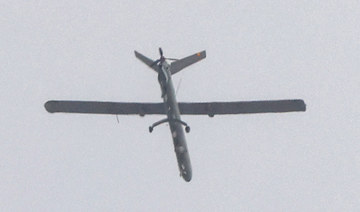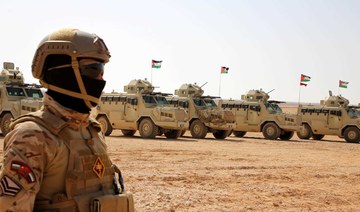BEIRUT: Hezbollah on Tuesday intensified its military operations against Israeli forces by targeting army positions across the southern border of Lebanon. It came as Israel stepped up its ground assault on the Gaza Strip.
Israeli forces responded to the Hezbollah activity by launching air and artillery strikes on Lebanese villages and towns, reportedly using phosphorus shells. The use of such weapons in civilian areas is prohibited under international law.
Abbas Hajj Hassan, Lebanon’s agriculture minister, said: “The Israeli army deliberately burned more than 40,000 old olive trees with internationally banned white phosphorus bombs.”
Hezbollah said it had targeted “an Israeli force positioned on Al-Khazzan Hill in the vicinity of the Israeli Orontes site. The attack involved the use of guided missiles, resulting in accurate hits on the Israeli force, and all of its members were killed or wounded.”
The group also claimed to have hit “the Israeli Al-Marj site in Wadi Hunin, opposite the Lebanese town of Markaba, with guided missiles,” and attacked “the Israeli site in Bayad Blida.”
Israeli forces targeted border towns and villages south of the Litani River, and the area around a Lebanese army base in Ras Naqoura, with shells and raids.
In addition, incendiary phosphorus shells reportedly were fired at the forests around the village of Alma Al-Shaab, and the Wadi Al-Aleq area between the towns of Marwahin and Al-Bustan.
In a message posted on social media site X, the Israeli army said: “Fighter aircraft attacked Hezbollah’s infrastructure on Lebanese territory. Among the infrastructure that was attacked, weapons, sites and places used by the organization were destroyed.”
Peacekeepers from the UN Interim Force in Lebanon activated their sirens several times on Monday night as a result of bombing in the south of the country.
According to Amnesty International, the current deployment of phosphorous weapons by Israeli forces is not the only time they have used them recently.
The rights group said: “The Israeli army fired artillery shells containing white phosphorus during military operations along Lebanon’s southern border between Oct. 10 and 16.”
Aya Majzoub, the organization’s deputy director for the Middle East and North Africa, said: “The Israeli army’s use of white phosphorus in a way that does not distinguish between civilians and military personnel is a horrific act that violates international humanitarian law.
“The illegal use of white phosphorus in the town of Dhahira in Lebanon on Oct. 16 put the lives of civilians in extreme danger, as many of them were taken to hospitals. Village residents were forced to flee, and their homes and cars were burned.”
Hezbollah chief Hassan Nasrallah is scheduled to deliver a speech on Friday. In the meantime there is a clear sense of unease among the Lebanese people, with noticeably less activity at markets and on the roads, particularly in the south of the country and in Beirut and its southern suburbs, compared with the more normal daily bustle in the mountainous regions.
There are also signs that some people are making plans to move to the north of the country, should the fighting in the south get worse.
A real estate agent told Arab News: “All the apartments in the town of Faqra (in Mount Lebanon, northeast of Beirut), for example, and furnished apartments there are fully booked and clients have paid advance rents in anticipation of any possible Israeli escalation.”
Lebanon’s Druze leader Walid Jumblatt said he has sent a message to Nasrallah in which he expressed the hope that “the country would not slide into war,” and added that Nasrallah “is aware of the suffering, I believe, and what is required is restraint.”
Mohanad Hage Ali, deputy director for research at the Malcolm Kerr Carnegie Middle East Center in Beirut, told Arab News: “Hezbollah perceives the ongoing battles as a crucial fight for survival. In the event of Hamas’ defeat there would be a notable shift in Israel’s security and military strategy, favoring preemptive strikes. Hezbollah is cognizant that it will inevitably face similar circumstances following Hamas’ downfall.
“Hezbollah is currently increasing the frequency of its strikes on Israeli military sites. Where it used to strike one or two sites, we now count 11 or 12 sites targeted by Hezbollah daily, and this will escalate as the attack on the Gaza Strip progresses.”
Ali said Hezbollah’s escalation will be limited to a specific geographical area and that Nasrallah’s speech on Friday is not expected to result in any deescalation.
In the meantime, he added, there are ongoing discussions in Israel about extending the battlefront at the northern border with Lebanon. Advocates of this approach argue that it is imperative to address the Hezbollah threat in the near future and that there are more feasible objectives that might be achieved on this northern front than in Gaza.
Israeli Prime Minister Benjamin Netanyahu said: “We are working to effectively deter the northern front and I repeat to Hezbollah, you will make the mistake of your life if you decide to intervene comprehensively in the battle. You will receive a blow that you cannot even imagine.”
Defense Minister Yoav Gallant said: “We continue to respond to every threat targeting us from the north, and whoever drags us into war will pay a heavy price.
“We are on the defensive on the Lebanon front and our forces are ready to respond to any aggression from the north. What is happening in Gaza is a message to Hezbollah.”
Minister of Strategic Affairs Ron Dermer warned that Israel “does not seek escalation in southern Lebanon but we must be prepared for that.”
Ali suggested that the best option for Hezbollah would be to adopt a more defensive strategy. He said that Nasrallah is likely, during his speech on Friday, to highlight the growing anger among Arabs about Israeli massacres of Palestinians. He predicted the speech would represent a significant moment for the wider Arab community, possibly encouraging many people to participate in demonstrations.
Hezbollah “still has many actions pending within its operational framework,” he said, adding that he fears the potential Israeli retaliation.


























